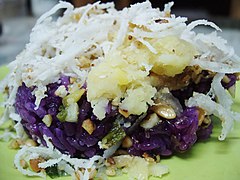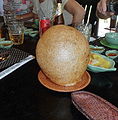Xôi
You can help expand this article with text translated from the corresponding article in Vietnamese. (March 2023) Click [show] for important translation instructions.
|
Xôi (Vietnamese pronunciation: [ʃoj˧˧]) is a traditional dish of Vietnamese people.
Etymology
[edit]Since ancient times, there has not been yet any research that can explain the word "xôi" in Vietnamese language or at least can find a form of inter-text. However, according to the survey of researcher Trần Quang Đức[1], this term appears in the brain as a manifestation of a dish made from "gạo nếp" ("glutinous rice") and is almost the only ingredient. Therefore, in Vietnamese dictionaries, this word is classified as single ones, meaning it can only be a noun, not any other form.[2]
In some reviews of Vietnamese cuisine since the 1990s, this dish has been translated as "sticky rice". However, this translation is thought to be not yet close to the reality of things.
Besides, xôi has a more ancient call and is now only used in rural areas, which is "cơm nếp" ("the meal of sticky rice").
History
[edit]Xôi is a savory (mặn) or sweet (ngọt) Vietnamese dish made from glutinous rice and other ingredients. Xôi is a common on-the-go breakfast item, and a popular snack nationwide. Although it is often served as a breakfast or dessert, people also eat it at lunch or dinner as a main dish in many areas in Vietnam.
Varieties
[edit]Savory
[edit]Savory xôi are called xôi mặn in Vietnamese. They include the following varieties:
- Xôi ngô or xôi bắp – made with corn and smashed cooked mung beans
- Xôi cá – fried fish xôi
- Xôi chiên phồng – deep-fried glutinous rice patty
- Xôi gà – with chicken
- Xôi khúc – with mung bean filling with a coating of pandan leaves paste
- Xôi lạc[3] (northern Vietnamese name; called xôi đậu phộng or xôi đậu phụng in southern Vietnam) - made with peanuts
- Xôi lam – cooked in a tube of bamboo of the genus Neohouzeaua and often served with grilled pork or chicken; a specialty of highland minority groups
- Xôi lạp xưởng or xôi lạp xường – served with Chinese sausage, meat floss and boiled quail egg
- Xôi pate – served with pâté and hams
- Xôi sắn or xôi khoai mì – cooked with cassava
- Xôi thập cẩm – subgum xôi
- Xôi thịt kho – served with thịt kho tàu (caramelized pork and eggs)
- Xôi trứng – served with fried eggs, caramelized eggs or omelette
- Xôi xéo – served with smashed mung beans, fried onions, and rousong
- Xôi xíu mại – served with siu mai
Sweet
[edit]Sweet xôi are called xôi ngọt in Vietnamese. They include the following varieties:
- Xôi bắp – made with corn, sugar, fried onions, and smashed cooked mung beans
- Xôi đậu đen – made with black urad beans
- Xôi đậu xanh[4] – made with mung beans
- Xôi dừa – made with coconut
- Xôi gấc[5] – made with the aril and seeds of the gấc fruit
- Xôi lá cẩm (also called xôi tím) – made with the magenta plant
- Xôi lá cẩm đậu xanh – made with the magenta plant and mung beans
- Xôi lá dứa – made with pandan leaf extract for the green color and a distinctive pandan flavor
- Xôi lam – cooked in a tube of bamboo of the genus Neohouzeaua and often served with sesame seeds and salt; a specialty of highland minority groups
- Xôi lúa – with boiled waxy maize, fried shallot and mung bean paste
- Xôi nếp than – made with black glutinous rice
- Xôi ngũ sắc – 5-colored xôi: purple from the leaf extract of the magenta plant, green from pandan leaf, red from gấc fruit, yellow from mung beans, and the white color of natural glutinous rice
- Xôi nhộng – made with silk worms
- Xôi sầu riêng – made with durian
- Xôi vị – hard cooked xôi with pandan leaves.
- Xôi vò – the glutinous rice grains do not stick together in this type of xôi, as they are coated with ground peeled-and-boiled mung beans
- Xôi xiêm – cooked with coconut juice
- Xôi xoài – made with coconut milk and fresh ripe mango; of Thai origin
Gallery
[edit]-
Bánh khúc
-
Xôi khúc (or xôi cúc, bánh khúc) when intact
-
Xôi khúc and the core inside
-
Xôi sắn
-
Xôi chiên side dishes
-
Xôi mỡ hành
-
Xôi giò trứng
-
Xôi đỗ xanh
-
Xôi cúc sprinkled with scallions that have been sautéed
-
Xôi giò lạp xường
-
Xôi lá cẩm was interrupted
-
Xôi gấc
-
Xôi gấc used in weddings
-
Xôi ruốc in a Northern wedding
-
Xôi cá rô
-
Xôi nén
-
Particular food in Vietnam
-
Xôi nếp of Thái people
See also
[edit]- Similarities : Bánh chưng · Bánh dày · Bánh đòn · Bánh lá liễu · Kao niew mamuang · Khao lam · Lemang · Okowa · Zhú-tǒng-fàn
- Chả
- Chè
- Cơm
References
[edit]- ^ Vân Trai Trần Quang Đức, Ngàn năm áo mũ : Lịch sử trang phục Việt Nam giai đoạn 1009–1945, Nhà sách Nhã Nam & Nhà xuất bản Thế Giới, Hà Nội, 2013.
- ^ Xôi
- ^ "Way to easily cook delicious xôi lạc" (in Vietnamese). 14 November 2013. Retrieved 4 March 2017.
- ^ Thanh Lê (7 January 2015). "Tricks to simply make xôi đậu xanh by rice cooker" (in Vietnamese). Khỏe & Đẹp. Phunutoday.vn. Retrieved 4 March 2017.
- ^ "How to make delicious xôi gấc for New Year celebrations" (in Vietnamese). Retrieved 4 March 2017.
























